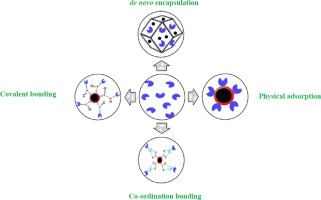International Journal of Biological Macromolecules ( IF 7.7 ) Pub Date : 2018-08-30 , DOI: 10.1016/j.ijbiomac.2018.08.126
Shamraja S. Nadar , Virendra K. Rathod

|
Enzymes are nature's catalysts which are highly selective and efficient. Recently, metal organic frameworks (MOFs) have captivated great attention as an attractive porous support matrix for immobilization of enzymes. An outstanding improvement in catalytic efficiency, enhanced chemical/thermal stability, easy accessibility to active sites, promising recyclability and high enzyme loading are some of the fascinating features of enzyme-MOF composites. Due to low density and high dispersion, the handling and separation of enzyme-MOF composites is challenging. Hence, metal organic framework with magnetic properties (magnetic–MOF) can be a potential candidate as it possesses sophisticated structural design integrated with magnetic properties. Specifically designed magnetic–MOF offers novel properties such as devisable composition, large surface area, easy loading and rapid collection which make it potential amenable for enzyme immobilization (magnetic-enzyme-MOF). This article highlights the different strategies for enzyme immobilization such as physical adsorption, covalent binding, co-ordination bonding and de novo encapsulation method. It further discusses about the artificial enzyme properties of magnetic–MOF coupled with enzyme to extend its application in biosensor.
中文翻译:

磁性金属有机骨架(magnetic-MOF):酶固定和纳米酶应用的新型平台
酶是天然的催化剂,具有很高的选择性和效率。近年来,金属有机骨架(MOF)作为固定化酶的有吸引力的多孔载体基质已引起了极大的关注。酶-MOF复合材料的一些引人入胜的特征是催化效率的显着提高,化学/热稳定性的提高,易于接近活性位点,有前途的可回收性和较高的酶负载量。由于低密度和高分散性,酶-MOF复合材料的处理和分离具有挑战性。因此,具有磁性(metal-MOF)的金属有机骨架可以成为潜在的候选者,因为它具有结合了磁性的复杂结构设计。经过特殊设计的磁性MOF具有新颖的特性,例如合适的成分,较大的表面积,易于装载和快速收集,使其有潜力进行酶固定(磁性酶-MOF)。本文重点介绍了酶固定化的不同策略,例如物理吸附,共价结合,配位键合和从头封装方法。它进一步讨论了磁性-MOF与酶结合的人工酶特性,以扩展其在生物传感器中的应用。































 京公网安备 11010802027423号
京公网安备 11010802027423号